Flavil Hall
Soulful, Hopeful, Helpful
by Bruce Daugherty
Georgia hymnwriter and preacher Flavil Hall had a long but turbulent relationship with the Christian Leader. He began contributing a weekly article under the title “Field Reports and Helpful Thoughts” in 1913. Later he would become an associate editor writing a column entitled “Soulful, Hopeful, Helpful Thoughts.” But he would be among the few casualties on the Leader staff to the pre-millenialist wars.
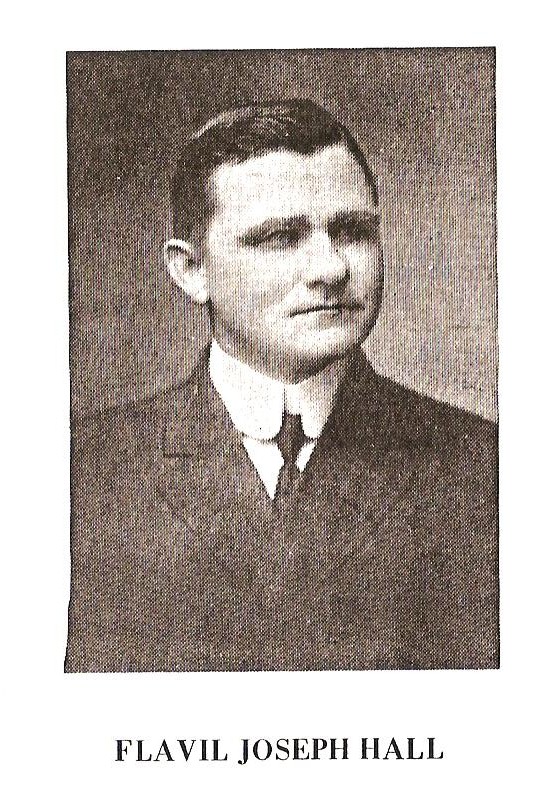
Flavil Joseph Hall was born near Trion, Georgia on June 22, 1876. His father, Robert T. Hall was proud of his Irish ancestry and gave his son the Irish name Flavil, meaning golden haired youth. His mother was Sarah Doliska Mills. She taught her children to read at an early age. Flavil would later say, “I can not remember when I could not read the New Testament.”(F. Hall, 1925, 5). The young Flavil proved to be an apt and prodigious student. But sorrow filled the Hall home when his mother passed away a few days after Flavil’s eighth birthday. Four lonely years were spent by the father and his young children in the cabin in Halls Valley, Georgia. But this changed when his father remarried and brought Eliza Morton home to be the step-mother to his children.
Hall’s father was a faithful Christian and his example set the tone for Flavil’s early obedience to the gospel when he was baptized in 1890 by N. J. Tumlin. Hall determined to preach and attended the Nashville Bible School.(Finley, 236). Among his fellow students in 1902, he met S. H. Hall, with whom he would later collaborate in evangelistic work in Georgia and hymn writing.
Hall began preaching in Trion, Georgia in 1896. It was about this time that he married Martha Jay King of Tennessee. To the Halls were born three children: Gardner Sewell, Effa Zellner, and Leslie Wright.(F. Hall, Truth, 106). Like the other men on the Leader staff, Hall began his preaching career holding evangelistic meetings. His family would share in the sacrifices of the preacher’s life, enduring the long periods when their father was away and the difficulties of making financial ends meet. The Hall famiy would know sorrow as his wife passed away in 1913. His stepmother raised the three children for the next six years until Hall was remarried to Bertha Williams on June 7, 1919. (F. Halll, 1927, 5).
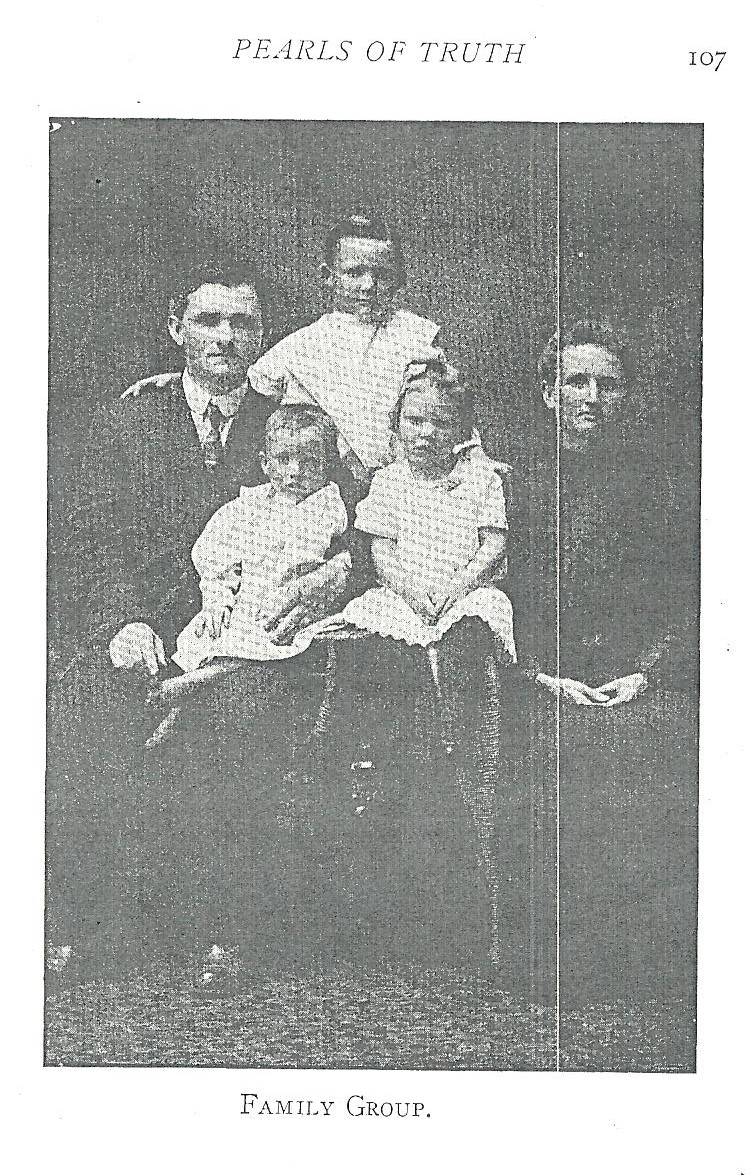
Hall utilized the printed page early in his ministry. His first articles were submitted to the Gospel Advocate when J. W. Shepherd was the office editor. From 1908 to 1912 Hall was on the staff of Stanford Chamber’s Christian Word and Work out of New Orleans. Along with S. H. Hall, he co-edited the Gospel Message department.(F. Hall, 1912, 2). In 1913 he began writing for the Christian Leader.(F. Hall, 1924, 6). That same year Fred Rowe published Hall’s Pearls of Truth, a collection of spiritual prose and poetry.
Flavil Hall also used songbooks for preaching the gospel message. Prior to 1908, Hall had written several hymns but only the Methodist song writer J. D. Vaughn thought Hall’s songs worthy of inclusion in a book. At the invitation of S. H. Hall, Flavil Hall came to Rockmart, Georgia to assist in a gospel meeting for a congregation that had only one member who believed that instrumental music was Biblically unauthorized. S. H. Hall said this attitude was typical of all the churches in the Atlanta area at that time. That one member, H. M. McCrae, was able to secure the meeting house for a gospel meeting. With Flavil Hall’s help, S. H. thought that this would be an ideal opportunity to demonstrate the teaching aspect of acappella music. Flavil Hall gathered more than three hundred songs with the purpose of compiling a hymnal which would express “in song the full gospel of Christ.” Together, the Halls compiled The Gospel Message in Song. S. H. Hall credited the work on the hymnal for changing attitudes towards the instrument in Rockmart and the Atlanta congregations. "There can be no doubt that Flavil and I being there for the purpose of finishing the compilation of our first song book had much to do in our success. For it diverted the minds of the people, to a degree, from a revival to the idea of getting out a book which taught the gospel in song as fully as we teach it in a sermon. Comments were made on some of the songs, and naturally the idea got into the minds of the people that we must be as careful about the wording of the songs, the teaching and exhortation required in the songs, being as sound as our sermons are supposed to be." (S. H. Hall, 79).
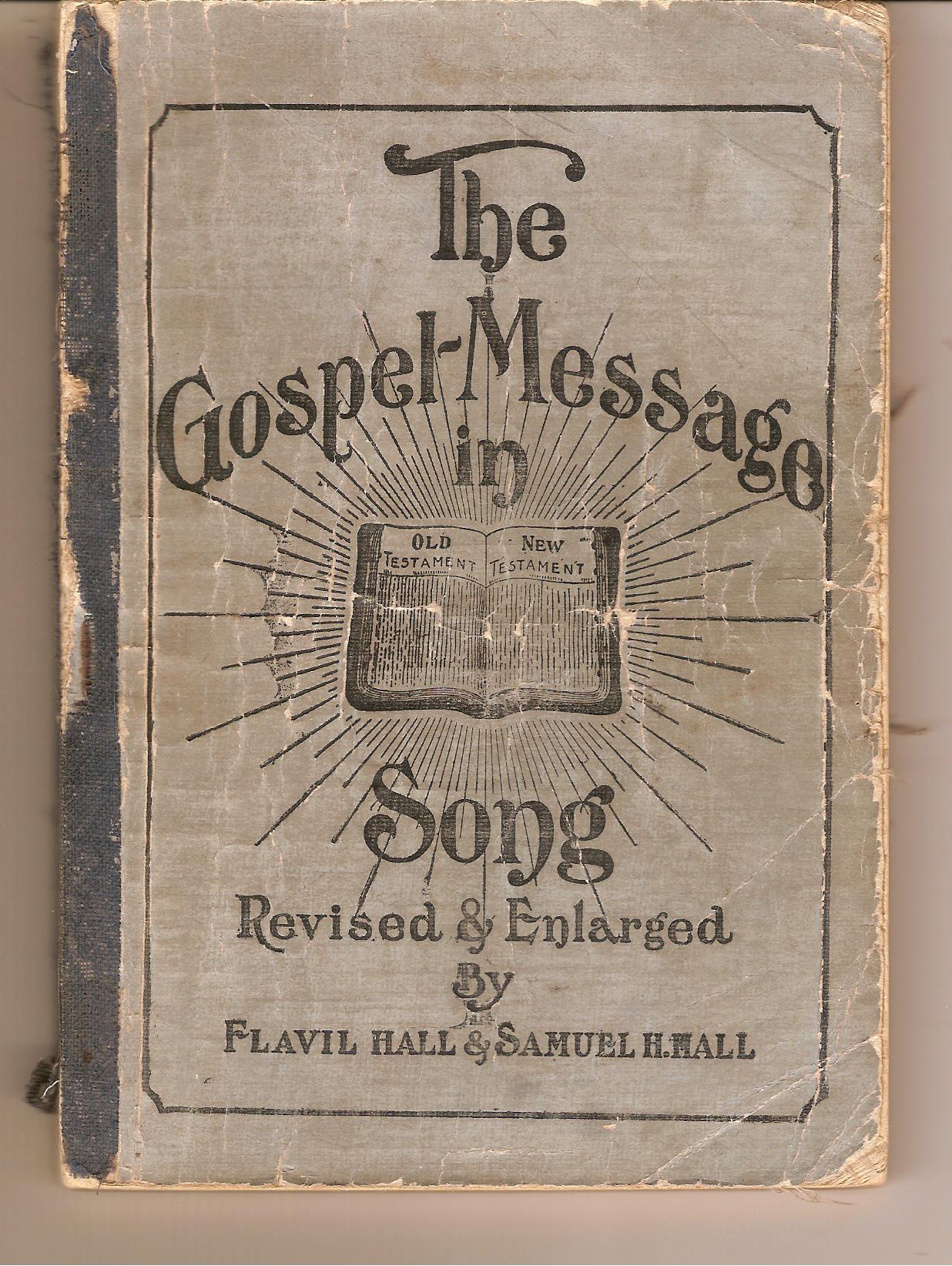
Over the next 22 years, Flavil Hall would compile eight songbooks. He also put together his own Rudiments of Music for singing school instruction. He would hold these regularly along with his gospel meetings. He believed that if congregations were going to avoid the innovation of the instrument added to worship it would come through their training and involvement in learning to sing. 1911 was the first year that Flavil Hall began making evangelistic trips to the Ohio Valley. He preached mostly for smaller congregations in southeastern Ohio, developing long lasting friendships with several families. Hall described his reception in the North: "I love the land O’Dixie, but my heart goes out in deepest gratitude toward the disciples, north, for the warmness with which they have received me, have heard me preach, and sung my songs." (F. Hall, Jul. 7, 1914, 10). In his later years, Hall would make a circuit of his preaching, heading North in early spring and traveling as far as Canada as he held meetings and singing schools, then returning South to Pine Apple, Alabama as the weather started turning.
The home base for Flavil Hall was always his cabin in Halls Valley near Trion, Georgia. But Hall also located in other places. The first was in Holland, Georgia where E. W. Moon had established Emmerson Orphan’s Home and Bible school. Hall went there to help Moon in the work. He did not stay there long but continued to help the school. In 1928 Hall moved to Pontiac, Michigan. This was a mission point and his support initially came from the Vinewood congregation in Detroit. The Halls stayed in Pontiac two years. Due to the depression and indebtedness on the house of worship, the church at Pontiac could no longer support them even though they commended them highly for their labors. "Bro. Hall has also proven himself a faithful preacher and teacher of the gospel. Both their lives have been true examples in word, in spirit, in faith, in charity, and in purity. Bro. Hall’s knowledge of music and ability to sing, has also been worth much to the cause here." (Commendation, 5).
After returning home to Georgia, Hall went back North, locating with the church in Portland, Indiana in the fall of 1931. He would preach in Portland for two years. He then worked briefly in a downtown Cincinnati mission point, then moved to Millport, Alabama. From 1940 to 1952 Hall’s home base was Pine Apple, Alabama where he would preach for the Awin congregation when not engaged in meeting work.(Bill Hall).
But friction on the Leader staff between Hall and Fred Rowe and some of the other editors was building. The pre-millenial teachings of R. H. Boll and the staff of Word and Work, now in Louisville, were being fiercely opposed by Foy E. Wallace, Jr. While Fred Rowe, Ira Moore, T. Q. Martin, and Thad Hutson shared in Wallace’s opposition to Boll’s teaching, Ben Elston and Flavil Hall defended Boll’s right to hold a difference of opinion on a matter that did not, in their judgement, interfere with the work and worship of the church. The friction would lead to an estrangement of both Elston and Hall from the Leader.
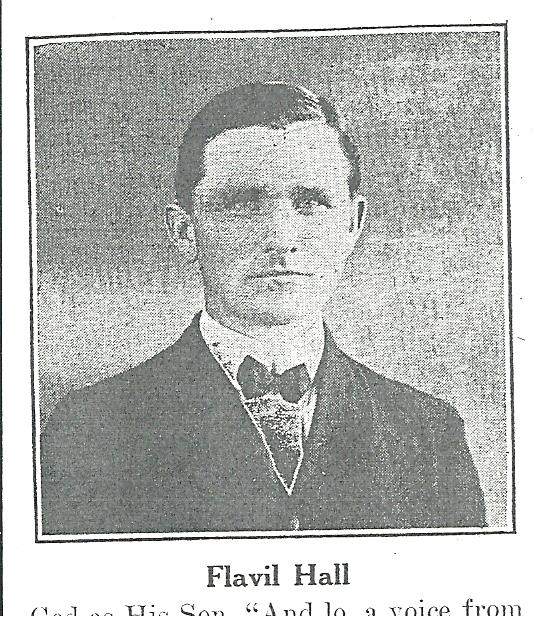
His response to the pre-millenial question however, revealed an eccentric trait in Flavil Hall. Hall’s writings increasingly became defensive, especially when written in behalf of others. Also, once an exchange had begun, Hall did not know when to quit. When T. Q. Martin wrote that a missionary to Brazil was using terminology like the denominations, Hall came to the missionary’s defense, denying that the young man meant to teach a false doctrine. The dispute between Martin and Hall continued for several weeks ending only when Fred Rowe stated that the missionary could answer Martin for himself.(Rowe, Martin, 9). When Hall carried into his Leader column his dispute concerning how the Gospel Advocate had treated John T. Lewis, Fred Rowe said: "Bro. Flavil Hall’s article is published this week somewhat reluctantly by the publisher, but on Brother Hall’s promise to have this end the matter, we let it appear." (Rowe, Condenser, 9). Again, in a discussion that Hall had carried in the Leader with Frank Morrow on the subject of “the good Confession,” Rowe stated: "I admit that I have not treated Bro. Morrow fair. Morally, legally, and parliamentarily (if not scripturally) Brother Morrow was entitled to another statement, but I knew it would be easier to stop Bro. Morrow than to try and stop Bro. Hall." (Rowe, 1931, 8).
Though Flavil Hall no longer appeared in the Leader columns he continued to make his evangelistic trips to the Ohio Valley throughout the 1940's. In 1950,he published another book of prose and poetry, Pearls of Grace and Glory. Flavil Hall’s voice was stilled when he died at Greenville, Alabama on August 16, 1952.(Hinton, 756). His early collaborator in song stated: "If you did something that he thought was not just and right toward another, it distressed him, and it seemed he just had to say or write something about it. This led him to be misunderstood by many. . . . I loved him and will ever remember the good he did in helping me to get song’s place in the heart of the members in Atlanta in the early days of our work." (S. H. Hall, 82).
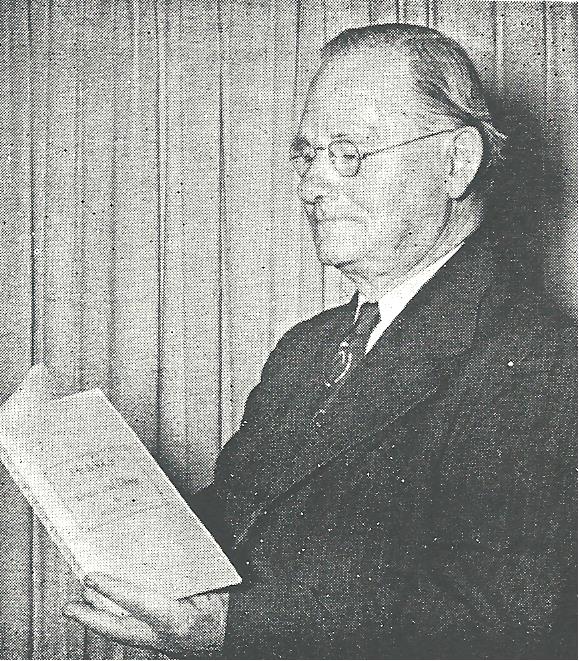
Books by Flavil Hall
Pearls of Truth. Cincinnati: F. L. Rowe Publishing, 1913.
Pearls of Grace and Glory. Pine Apple, AL: Privately Published, 1950.
Hall’s Rudiments of Music. Cincinnati: F. L. Rowe Publishing, 1925.
Songbooks edited or co-edited by Flavil Hall
Gospel Message in Song - Gospel Message Publishing, 1908.
Redemption’s Way in Song - F. L. Rowe Publishing, 1911.
Jesus in Song - F. L. Rowe Publishing, 1915
The Cross and Resurrection in Song - S. H. Hall & Flavil Hall, 1917.
Ninety and Nine Living Songs - F. L. Rowe Publishing, 1922.
Truth and Hope (In Song) - 1926
Song Heart Thrills - F. L. Rowe Publishing, 1932.
The More Perfect Gospel Hymnal.
Works Cited
Bill Hall, Awin, AL to Bruce Daugherty, Cambridge, OH. (Jul. 7, 2004).
"Commendation" Christian Leader (Aug. 26, 1930):5.
"Flavil Joseph Hall" Our Garden in Song, Gene C. Finley, ed. West Monroe, LA: Howard Publishing, 1980.
Hall, Flavil J. "Thoughts - Personal and Reminiscent" Christian Leader (Jun. 30, 1925): 5.
_________. "They Pass Beyond Our Vision" Christian Leader (Oct. 4, 1927): 5.
_________. "Field Notes and Helpful Thoughts" Christian Leader (Oct. 14, 1924):6.
_________. "Gospel Message Department" Christian Word and Work vol. 5, no. 1 (1912): 2.
_________. Pearls of Truth. Cincinnati: F.L. Rowe, Publisher, 1913.
Hall, Samuel H. Sixty Years in the Pulpit. Nashville: Old Paths Book Club, 1955.
Hinton, Pryde E. "At Rest" Gospel Advocate (1952): 756.
Rowe, Fred. "Let Brother Martin Do It" Christian Leader (Apr. 26, 1932):9
_________. "Condenser" Christian Leader (Apr. 22, 1930):9.
_________. No title Christian Leader (Dec. 22, 1931):8.
